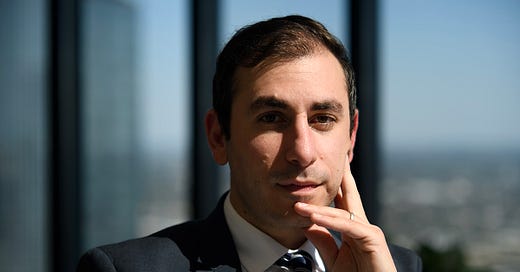
For Eithan Haim, operating on patients provides a welcome break from the federal criminal indictment hanging over him. Haim, who is 34 years old, works as a general surgeon at a regional hospital in Texas, dealing with ruptured appendixes, gunshot wounds, and whatever else comes through the ER. “Whenever I go into an operating room, any stress is gone,” he says. “It’s a beautiful thing.”
Haim’s alleged crime? That he violated HIPAA, a patient privacy law, when he revealed that Texas Children’s Hospital was providing gender transition treatments to minors after it announced that such services had been “paused.” The U.S. Department of Justice has charged him with four felonies, which could land Haim in prison for the next decade.
I met Haim recently at his house east of Dallas, where he lives with his wife and their newborn daughter. That afternoon he had just returned from removing someone’s gallbladder and was still dressed in his green scrubs. Haim is quick to launch into a story, whether it’s explaining how you massage a patient’s heart after it’s stopped beating, or describing his days as an aspiring musician before he decided to become a doctor.
The story of how he was indicted begins in 2022, when Haim was a surgical resident. He discovered then that Texas Children’s, the largest children’s hospital in the country, was inserting puberty blocker implants in young patients with gender dysphoria—that is, distress at one’s biological sex. After studying the medical literature on the subject, Haim came to the conclusion that delaying puberty in gender-questioning children was not only unwise, but unethical.
“Kids come into the hospital because they’re sick, and you make them better because they want to live a normal life,” he told me. “But then here’s this other situation where, in the same operating rooms, they’re taking healthy children and they’re making them sick for the rest of their life.”
He wasn’t the only one at Texas Children’s who was concerned. A small group of fellow resident doctors had whispered conversations in what Haim calls “the dark corners of the hospital.” One resident told Haim about feeling uncomfortable when asked to assist in the insertion of a puberty-blocking device in a patient’s arm, but felt that—as a mere resident—he couldn’t object. “We rely on the hospital’s good graces in order to graduate,” Haim says. “You know if you challenge that, they will destroy you.”


